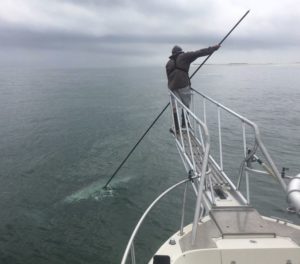CHATHAM – The Massachusetts Division of Marine Fisheries five-year white shark population study is nearing completion and scientists will begin a new wave of research off Cape Cod this summer.
Since 2014, research led by state marine biologist Dr. Greg Skomal has been conducted to get a more accurate picture of how many sharks spend their summers in waters off the Cape.
Results from the five-year study are expected to be released soon.
The Atlantic White Shark Conservancy, in collaboration with DMF, will start several projects that are focused on getting a better understanding of the predatory behavior of white sharks in the region.
“The big focus now is to get better information to inform public safety practices,” said Megan Winton, a staff scientist with the Atlantic White Shark Conservancy.
“The best way we can do that at this point is to learn more about what these animals are doing in the waters off of the coast.”
The research conducted over the next five years will be a continuation of the previous population study.
“Now the focus is to really get as many tags on animals as we can to get a better idea of what the population is doing as a whole off of our coast,” Winton said.
Atlantic White Shark Conservancy CEO Cynthia Wigren said it is critical to get a better idea of hunting and feeding behavior from a public safety perspective.
“If sharks are feeding at certain times of the day or stages of the tide, for example, we can use that information to identify periods when the risk of interactions between sharks and recreational water users may be highest,” Wigren said.
The research will involve deploying tags that contain accelerometers similar to the small devices found in smartphones that allow for axis based motion sensing.
The accelerometers will record fine-scale movements of white sharks and give researchers a more detailed picture of their behavior.
Skomal will continue tagging sharks off the Outer Cape.
A portion of the research efforts this summer will move into Cape Cod Bay due to increased reports of shark sightings and interactions with fishermen.
“Given the structure of the survey we have been conducting the past five years, we haven’t had a chance to get into the bay to see what is going on there,” Winton said. “We are really excited about that work.”
Winton said they know from tagging data that sharks tagged on the Outer Cape have been found to travel into the bay.
“We have gotten reports from fishermen going after striped bass in the bay is that there seems to be a lot of small white sharks in the bay that have cued in to the fact that they can get a nice free meal at the end of a striped bass fisherman’s line,” she said.
Data gathered will be used to estimate feeding frequency, identify environmental conditions that relate to feeding, and determine how many seals are being consumed by white sharks in the region.
By BRIAN MERCHANT, CapeCod.com NewsCenter
























